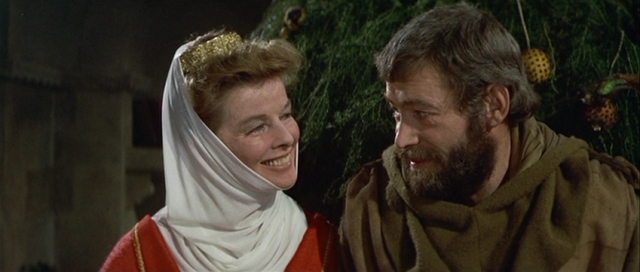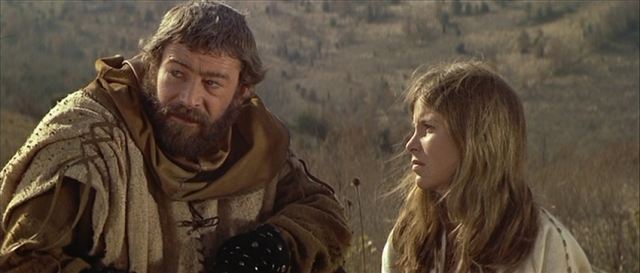
“Well, what shall we hang: the holly, or each other?”
It’s a question that might arise at any dysfunctional family’s Christmas gathering, if not aloud then at least in the minds of the participants. But when that Christmas is in the year 1183 and that dysfunctional family happens to be royal, as is the case in Anthony Harvey’s 1968 film The Lion in Winter, it takes on a potentially literal meaning.

England’s King Henry II (Peter O’Toole, who had played a younger version of the monarch in 1964’s Becket) is fifty years old, making him the oldest man he knows. (“I’ve got a decade on the Pope!”) In the course of nearly thirty years in power, he’s managed to build up a sizable kingdom, and what will happen to it after his death is a matter of great concern. Out of his three surviving (legitimate) sons, he’s selected the youngest, John (Nigel Terry), as his heir. John is dimwitted, badly behaved and badly groomed, but he’s Henry’s favorite, and the king’s wishes are law — except that it’s a bit more complicated than that.
Henry’s estranged wife, Eleanor (Katharine Hepburn), whom he’s kept locked up in another castle for the past decade (and describes as both “Medusa” and “a woman out of legend”), favors eldest son Richard (Anthony Hopkins), and she’s willing to do whatever it takes to put him on the throne. Middle son Geoffrey (John Castle), meanwhile, neglected by his parents all his life, is nonetheless their equal for scheming, and he’s out for his own gain. Then there’s the matter of Alais (Jane Merrow), a young noblewoman sent to Henry’s household as a child so that she could eventually marry Richard; sixteen years on, the marriage still hasn’t taken place, and she’s become Henry’s latest mistress instead. Her brother Philip (Timothy Dalton), the teenage king of France, will be Henry’s guest over Christmas and hopes to resolve this issue, either by bringing about the wedding or by reclaiming the county of Vexin, which was Alais’s dowry. With everyone gathered under one roof, including Eleanor, it doesn’t take long for the machinations to begin.

In this perfidious atmosphere, plots are hatched, bargains made and alliances formed and broken with dizzying speed. There’s essentially no division between the personal and the political. “You love Henry, but you love his kingdom too. You look at him and you see cities, acreage, coastline, taxes. All I see is Henry,” Alais, the least conniving character, tells Eleanor, the woman who was once a mother figure to her but whom she now views in a much harsher light. (To complicate matters even further, Eleanor was married to Alais’s father, Louis VII of France, before she left him for the dashing young Henry, her junior by eleven years. Alais and Philip are the children of the late Louis’s second and third wives, respectively.) Everyone is a potential pawn in somebody else’s game, no matter what their relationship by blood or marriage, and love itself — romantic, filial, fraternal — is a weapon: a means of manipulation, of discrediting someone, of creating or reopening an emotional wound.
For all of their Machiavellian scheming, these are not people without human feelings; quite the contrary. Tempers flare, tears are shed, hearts are broken. Even icy Geoffrey makes no secret of the fact that his parents’ lifelong lack of interest in him has hurt him terribly, and no doubt helped to make him what he is. The past hangs heavily over all of the characters. They talk constantly of their altered relationships with one another, and of the dead who continue to haunt them or motivate their actions: parents, lovers, children. The future, too, is always looming over them, with the wars and murders and other disasters that might result from their current conundrum.

In spite of the gravity of their situation, however, the characters often carry out their battles with great zeal, clearly taking a rather sadistic pleasure in attacking and outwitting one another. (It’s fun to watch as well. At least one scene is downright farcical, with numerous people hiding behind curtains, and the dialogue is consistently sharp, witty and amusing.) Eleanor and Henry might be the fiercest combatants, particularly when they’re going head to head, although they can also be surprisingly affectionate. They have a long, rich history between them, even if they sometimes deny ever loving each other; they’re also old enough to be growing weary of all of this fighting, whether between nations or within their family, as Eleanor tells her sons at an especially bleak moment:
Oh, my piglets, we are the origins of war — not history’s forces, nor the times, nor justice, nor the lack of it, nor causes, nor religions, nor ideas, nor kinds of government, nor any other thing. We are the killers. We breed wars. We carry it like syphilis inside. Dead bodies rot in field and stream because the living ones are rotten. For the love of God, can’t we love one another just a little? That’s how peace begins. We have so much to love each other for. We have such possibilities, my children. We could change the world.
The cool, ever-calculating Geoffrey is quick to respond: “While we hugged each other, what would Philip do?” He has a point; at any rate, they all go back to scheming, including Eleanor. Peace on earth and good will toward men will have to wait for another Christmas.
This post is part of The Spencer Tracy & Katharine Hepburn Blogathon, hosted by In the Good Old Days of Classic Hollywood. Click the banner above to see all of the other great posts.


One of the best films ever. Katharine and Peter are beyond excellent in their respective roles. The music is out of this world, and the arguments are draining and intense. The film sort of reminds me of Who’s Afraid Of Virginia Woolf?, with those fascinating and draining shouting matches.
LikeLiked by 1 person
Yes, they’re both fantastic, especially when you consider the wide range of emotions and moods they have to convey. The Who’s Afraid of Virginia Woolf? comparison is great, although I think watching the two movies in close succession would be exhausting. 🙂
LikeLiked by 1 person
Indeed, that’s not a movie marathon I could manage lol.
LikeLiked by 1 person
I once worked with a woman who had no patience for classic film, but she listed “The Lion in Winter” as one of her all-time faves. She kept insisting I see it – and I still haven’t, although I’m not sure why. After reading your review, I’ll seek it out at the library. It sounds well worth it. 🙂
LikeLiked by 2 people
Hope you enjoy it!
LikeLiked by 1 person
Pingback: THE SPENCER TRACY AND KATHARINE HEPBURN BLOGATHON IS HERE – In The Good Old Days Of Classic Hollywood.
Hmmmm, I’ve never bothered to watch this. Now that I’ve read this, I’ll definitely be putting it on my watchlist! Great post
LikeLiked by 1 person
Thank you! I hope you like it.
LikeLike
Brilliant review! I kept putting off seeing this film, despite my love for Kate, because I was worried it would be a stodgy period piece. What a fool I was! I was absolutely riveted by every scene. Truly one of Kate’s best.
LikeLiked by 1 person
Thank you! It’s definitely not stodgy. 🙂
LikeLike
That was a very interesting analysis of the film! Kate was truly great in it and certainly deserved her Oscar and Peter was excellent as well! I love that shot of her holding her head. She’s so into her character!
LikeLiked by 1 person
Thanks! They’re both wonderful in their roles.
LikeLiked by 1 person
Erin, your review is as good as the film itself. It was also nice of you to remind me of the farcical scene with the people behind curtains – I had nearly forgot that!
Lion in Winter is a great movie, and besides the scheming, it’s wonderful to see O’Toole and Hepburn together, in magnificent performances.
Kisses!
Le
LikeLiked by 1 person
Thanks so much! I really like O’Toole and Hepburn together too.
LikeLike
Thanks so much for joining the blogathon, and sorry for the late reply. I’ve been sick with headaches and what not. “The Lion In Winter” is one of my favorite films, and I’d say one of Kate’s best performances, if not her best. Excellent article, and a great choice for the blogathon.
Don’t forget to read my late contribution to the blogathon.
LikeLiked by 1 person
Thank you, and I hope you feel better soon!
LikeLike